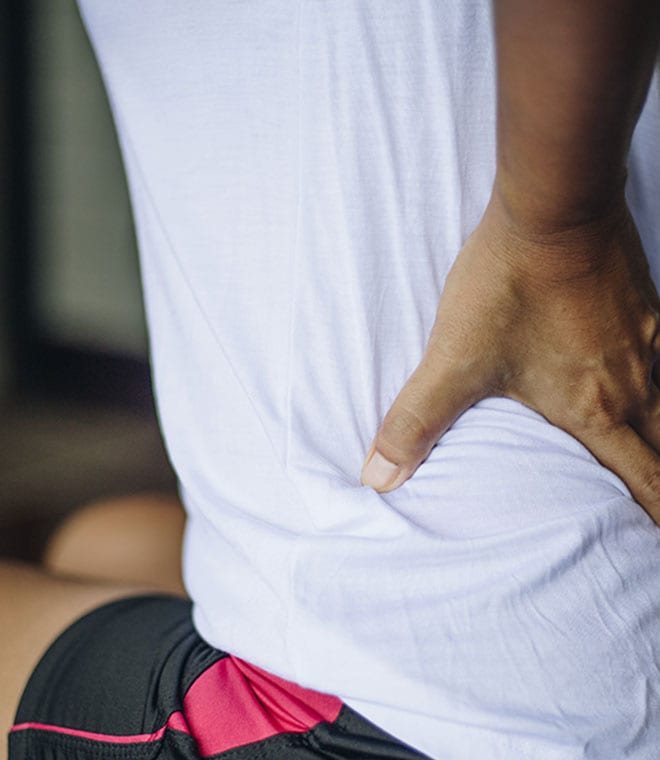Health
Why do I get back pain when breathing?
By Jean Cherry, RN, MBA Jun 05, 2022 • 7 min
Are you experiencing back pain that increases in intensity when you take a breath?
There are many reasons why back pain occurs when you breathe, which could be something less harmful or it may be a sign of a serious condition needing emergency medical attention, depending on the duration and severity of the pain and any other symptoms you may be experiencing. Always seek immediate medical care or call emergency services right away if you experience intense, unexplained back or chest pain while breathing or any other suddenly emergent symptoms, such as severe shortness of breath. You may need prompt medical attention for a serious or life-threatening health condition.
What are some of the more common reasons you experience back pain with taking in deeper breaths? It could be related to injury, illness, breathing disorders or something requiring immediate medical attention.
Injury
A common cause of upper back pain while breathing is from musculoskeletal injury. The intercostal muscles are located between each rib on each side of the rib cage, expanding and contracting to support breathing. Spraining or overstretching the intercostal muscles can cause severe pain.
Intercostal muscle injuries can also affect the lower back. External intercostal muscles and the diaphragm support breathing in, and internal intercostal muscles together with abdominal muscles support breathing out. This can cause severe pain initially, but it usually heals in several weeks with home treatments. The pain may be more noticeable when breathing deeply, coughing or stretching.
The most common causes of lower back pain when breathing are spinal lumbar muscle strains and sprains due to bending, moving and twisting. These conditions can occur suddenly from an injury or gradually through overuse. As the soft tissue in the lower back becomes inflamed, it causes spinal pain that radiates around the rib cage from the back toward the front of the chest. This pain can affect breathing.
Treatment for lumbar muscle strains may include ice, gentle stretches, acetaminophen or nonsteroidal anti-inflammatory drug medications, and rest as directed by your healthcare provider—although an X-ray or magnetic resonance image (MRI) may be ordered to rule out other causes, such as a rib fracture.
Illness
Multiple illnesses that affect your lungs could cause you to have back pain while breathing. Several respiratory conditions include:
Pneumonia—An infection in the lungs
Pleurisy—Inflammation of the tissue linings between the chest cavity and surrounding lungs
Bronchitis—an inflammation of the bronchial tubes in your lungs
Depending on the cause of the respiratory illness, treatments for respiratory conditions may include antibiotics, antifungals or antiparasitic medications, corticosteroids and nonsteroidal anti-inflammatory medications prescribed by a healthcare provider.
Other illnesses that can cause back pain that worsens when breathing include kidney infection or stones, gallbladder problems and appendicitis.
Spinal deformities, including scoliosis, fractured vertebrae and stenosis can become more painful with breathing. If spinal problems are suspected, X-rays and MRIs may be ordered. Treatment can include lifestyle modifications, such as losing weight or exercising, or may involve more intrusive treatment, such as injections or surgery.
Conditions requiring immediate medical attention
Serious causes of back pain while breathing that require emergency medical attention are:
Pulmonary embolism. You may have a blood clot in your lung if you experience sudden shortness of breath, sudden severe chest or back pain, fainting or weakness, a sudden spike in temperature over 100° (37°C) or coughing up blood. People at higher risk for a pulmonary embolism are those with a history of cancer or stroke, are pregnant or are hospitalized for a surgical procedure, or have an inherited clotting disorder. Emergency treatment is required.
Myocardial Infarction (heart attack). Symptoms of a heart attack vary from person to person, but the most common warning signs are chest pain and upper body discomfort in the back, arms, neck or jaw, accompanied by shortness of breath while at rest or with minimal physical activity. Fast action can save your life; call 911. An ambulance is the safest way to the hospital with emergency medical services staff checking you and starting medications or treatments quickly.
Lung cancer. If lung cancer spreads outside of the lung to the chest wall or spine, the tumor can push against your spine, causing pain while breathing and coughing. Seeking medical care for early detection is key for optimal treatment outcomes.
Angina (chest pain). Chest pain or discomfort that occurs when your heart isn’t getting enough oxygen may be caused by many conditions, including heart disease. The pain can spread to your back and seem worse while breathing. If you experience chest pain, especially with shortness of breath, seek immediate medical attention.
When to seek immediate medical care
Back pain while breathing may not be serious, but you should seek medical care right away to determine the cause and get appropriate treatment. If you experience intense, sharp or stabbing back or chest pain while breathing, you should always contact your healthcare provider or seek emergency services right away to receive immediate medical attention, as these symptoms can be life-threatening.
Clinically reviewed and updated by Julie McDaniel, MSN, RN, CRNI, June 2022.
Sources:
- https://www.aans.org/en/Patients/Neurosurgical-Conditions-and-Treatments/Spinal-Pain
- https://medlineplus.gov/ency/article/000087.htm
- https://www.uptodate.com/contents/treatment-of-community-acquired-pneumonia-in-adults-in-the-outpatient-setting/
- https://www.uptodate.com/contents/overview-of-the-risk-factors-pathology-and-clinical-manifestations-of-lung-cancer
- https://www.nhlbi.nih.gov/health-topics/pleural-disorders
- https://www.nhlbi.nih.gov/health-topics/heart-attack
- https://www.uptodate.com/contents/management-of-isolated-musculoskeletal-chest-pain
- https://www.uptodate.com/contents/treatment-prognosis-and-follow-up-of-acute-pulmonary-embolism-in-adults
- https://www.uptodate.com/contents/scoliosis-in-the-adult
- https://www.medicalnewstoday.com/articles/320925#causes
- https://johnshopkinshealthcare.staywellsolutionsonline.com/yourfamily/men/newsrecent/85,P00194.
- https://www.cdc.gov/pneumonia/causes.html



